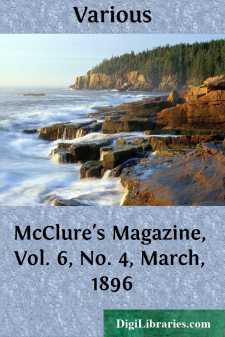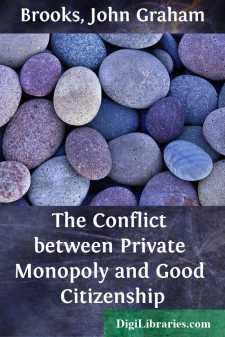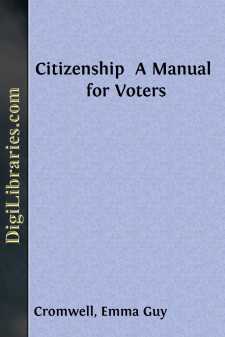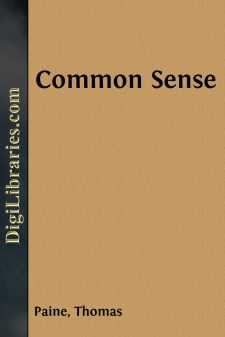Categories
- Antiques & Collectibles 13
- Architecture 36
- Art 48
- Bibles 22
- Biography & Autobiography 813
- Body, Mind & Spirit 142
- Business & Economics 28
- Children's Books 14
- Children's Fiction 11
- Computers 4
- Cooking 94
- Crafts & Hobbies 4
- Drama 346
- Education 46
- Family & Relationships 57
- Fiction 11829
- Games 19
- Gardening 17
- Health & Fitness 34
- History 1377
- House & Home 1
- Humor 147
- Juvenile Fiction 1873
- Juvenile Nonfiction 202
- Language Arts & Disciplines 88
- Law 16
- Literary Collections 686
- Literary Criticism 179
- Mathematics 13
- Medical 41
- Music 40
- Nature 179
- Non-Classifiable 1768
- Performing Arts 7
- Periodicals 1453
- Philosophy 64
- Photography 2
- Poetry 896
- Political Science 203
- Psychology 42
- Reference 154
- Religion 513
- Science 126
- Self-Help 84
- Social Science 81
- Sports & Recreation 34
- Study Aids 3
- Technology & Engineering 59
- Transportation 23
- Travel 463
- True Crime 29
McClure's Magazine, Vol. 6, No. 4, March, 1896
by: Various
Categories:
Description:
Excerpt
LINCOLN'S ELECTION TO THE TENTH ASSEMBLY.—ADMISSION TO THE BAR.— REMOVAL TO SPRINGFIELD.
HE first twenty-six years of Abraham Lincoln's life have been traced in the preceding chapters. We have seen him struggling to escape from the lot of a common farm laborer, to which he seemed to be born; becoming a flatboatman, a grocery clerk, a store-keeper, a postmaster, and finally a surveyor. We have traced his efforts to rise above the intellectual apathy and the indifference to culture which characterized the people among whom he was reared, by studying with eagerness every subject on which he could find books,—biography, state history, mathematics, grammar, surveying, and finally law. We have followed his growth in ambition and in popularity from the day when, on a keg in an Indiana grocery, he debated the contents of the Louisville "Journal" with a company of admiring elders, to the time when, purely because he was liked, he was elected to the State Assembly of Illinois by the people of Sangamon County. His joys and sorrows have been reviewed from his childhood in Kentucky to the day of the death of the woman he loved and had hoped to make his wife. These twenty-six years form the first period of Lincoln's life. It was a period of makeshifts and experiments, ending in a tragic sorrow; but at its close he had definite aims, and preparation and experience enough to convince him that he dared follow them. Law and politics were the fields he had chosen, and in the first year of the second period of his life, 1836, he entered them definitely.
The Ninth General Assembly of Illinois, in which Lincoln had done his preparatory work as a legislator, was dissolved, and in June, 1836, he announced himself as a candidate for the Tenth Assembly. A few days later the "Sangamon Journal" published his simple platform:
NEW SALEM, June 13, 1836.
"TO THE EDITOR OF THE 'JOURNAL':
"In your paper of last Saturday I see a communication over the signature of 'Many Voters,' in which the candidates who are announced in the 'Journal' are called upon to 'show their hands.' Agreed. Here's mine:
I go for all sharing the privileges of the government who assist in bearing its burdens. Consequently, I go for admitting all whites to the right of suffrage who pay taxes or bear arms (by no means excluding females).
If elected, I shall consider the whole people of Sangamon my constituents, as well those that oppose as those that support me.
While acting as their representative, I shall be governed by their will on all subjects upon which I have the means of knowing what their will is; and upon all others, I shall do what my own judgment teaches me will best advance their interests. Whether elected or not, I go for distributing the proceeds of the sales of public lands to the several States, to enable our State, in common with others, to dig canals and construct railroads without borrowing money and paying the interest on it.
"If alive on the first Monday in November, I shall vote for Hugh L. White for President.
"Very respectfully,
"A. LINCOLN."
The campaign which Lincoln began with this letter was in every way more exciting for him than those of 1832 and 1834....
















